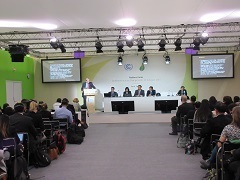Community forestry important for REDD+, say speakers at UNFCCC side-event
4 December 2015

Participants and speakers at the joint ITTO/MOECAF/MoEF/FA/WRI/BI side-event “REDD+ within INDCs: governance lessons learnt from community forest management in tropics”. Photo: ITTO
The side-event reviewed the role of REDD+ in the Intended Nationally Determined Contributions (INDCs) submitted by Indonesia, Cambodia and Myanmar to the UNFCCC. It also presented the issues of promoting REDD+ in the context of INDCs to achieve long-term climate goals; strengthening community forest management in the design and implementation of REDD+; and building on forest governance from community forest management practices and lessons. It also introduced the Global Forest Watch platform, an online transparent mapping application providing near-real-time data on what is happening in forests worldwide.
The following REDD+/climate/forest policy experts presented at the side-event (their presentations can be downloaded below):
- Nur Masripatin, Director General for Climate Change, Ministry of Environment and Forestry (MoEF), Indonesia (her keynote presentation was delivered by Novia Widyaningtyas, Head of the REDD+ Division, MoEF)
- Chheng Kimsun, Director General, Forestry Administration, Cambodia
- Thaung Naing Oo, Director, Forest Research Institute, Ministry of Environmental Conservation and Forestry, Myanmar
- Charles Barber, Director, Forest Legality Alliance and Government Relations, Forests Program, World Resources Institute.
About 200 people attended the side-event, including government officials and representatives of international organizations, bilateral aid agencies, research institutes and NGOs. Questions posed by members of the audience addressed: the challenge of managing forest resources by local communities mostly located in remote areas; ways in which such local communities could use the Global Forest Watch platform; whether REDD+ was being facilitated in Indonesia, Cambodia and Myanmar through top-down or bottom-up governance approaches; information access by local communities and efficient monitoring on the ground; successful livelihood improvement activities to support conservation by local communities; forest law enforcement in relation to forest fire in Indonesia resulting from human activities; selling forest carbon from Cambodia’s REDD+ projects; and effective multistakeholder participation in achieving Myanmar’s community forest programme’s target by 2030.
Speakers stressed that community forestry is one of the most important platforms for future REDD+ implementation and that there is an ongoing need to strengthen and scale up the level of support for community forestry to promote forest conservation and sustainable forest management.
ITTO jointly organized the side-event with the Ministry of Environmental Conservation and Forestry (MOECAF), Myanmar; the Ministry of Environment and Forestry (MoEF), Indonesia; the Forestry Administration (FA), Cambodia; the World Resources Institute (WRI); and BirdLife International (BI).